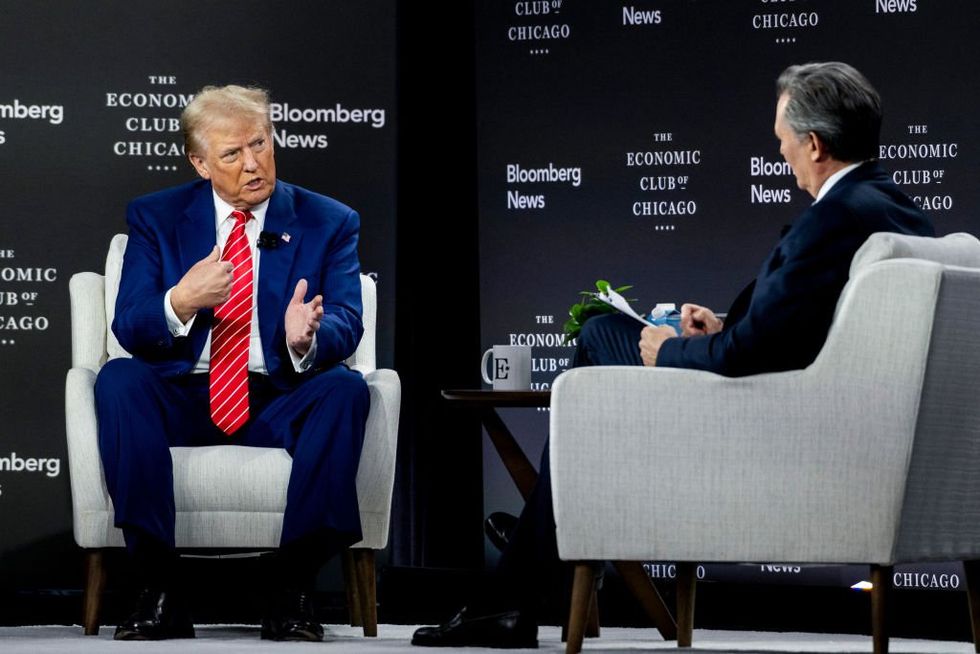Bloomberg interviewer's attempts to needle Trump backfire — and the crowd loves it
Leftist publications and the Harris campaign have tried desperately to spin President Donald Trump's Tuesday interview with the editor in chief of Bloomberg News as a botch job on the part of the Republican — calling it "disastrously bad," "rambling," "angry and unfocused," and "a total mess." The audience members present for the exchange at the Economic Club of Chicago were evidently of a different mind, both cheering on Trump's ripostes to Bloomberg's John Micklethwait, booing the interviewer's loaded questions, and giving the president a standing ovation. Micklethwait, who reportedly ordered his staff not to investigate Michael Bloomberg or his Democratic rivals prior to the 2020 election, attempted on several occasions to kneecap the Republican candidate but proved unsuited to the task. In one instance, the British Bloomberg EIC tried characterizing Trump's plan to impose significant tariffs on imports and on American companies that outsource manufacturing as potentially ruinous, suggesting that it might adversely impact the economy as well as foreign powers. Trump indicated that his tariff strategy during his first term was ramping up to major success prior to the pandemic, not only incentivizing companies to build factories in the homeland but bringing in "hundreds of billions of dollars just from China alone, and I hadn't even started yet." 'They've been wrong about everything.' Shortly after the Republican president reiterated that tariffs serve to protect American companies and those companies that will ultimately flood into the country, Micklethwait said: A lot of places like this, they rely — there are a lot of jobs that rely on foreigners coming here. You're going to basically stop trade with China. You're talking about 60% tariffs on that. You're talking, as you said, 100%, 200% on things you don't really like. You're also talking about 10, 20% tariffs on the rest of the world. That is going to have a serious effect on the overall economy. And yes you're going to find some people who would gain from individual tariffs. The overall effect could be massive. Trump rejected the Bloomberg editor's premise, saying, "I agree. It's going to have a massive effect. Positive effect. It's going to be a positive, not a negative." "I know how committed you are to this," continued Trump. "It must be hard for you to spend 25 years talking about tariffs as being negative and then have somebody explain to you that you're totally wrong." As the audience broke into laughter, Micklethwait tried in vain to reassert himself, insinuating that 40 million jobs dependent on trade might be lost on account of the tariffs. "You ready? John Deere. Great company. They announced about a year ago they're going to build big plants outside of the United States," said Trump. "They're going to build them in Mexico." "That's right. I said, 'If John Deere builds those plants, they're not selling anything into the United States,'" added Trump. Following the Bloomberg interview, the Wall Street Journal indicated John Deere has not yet axed its Mexican ambitions; however, Trump's potential re-election might prompt a rethinking of the company's extra-national focus. Micklethwait suggested further that Trump's proposed tariffs could undermine American foreign policy, in part by upsetting allies and "dividing" the West. "How does it help you take on China turning all of your allies against you?" asked the editor. "Tremendously because China thinks we're a stupid country, a very stupid country. They can't believe that somebody finally got wise to them," said Trump. "Not one president charged China anything. They said, 'Oh, they are a third-world nation. They are developing.' Well, we're a developing nation, too. Take a look at Detroit. Take a look at our cities. ... We have to develop more than they do." "Our allies have taken advantage of us more so than our enemies," continued the president, citing the European Union nations, Japan, and South Korea as countries that have benefited from other presidents' reluctance to impose tariffs. After several unsuccessful attempts to extract concessions from Trump on the topic of tariffs, Micklethwait suggested the Republicans' promises to drop taxes will cost trillions of dollars. "You're flooding the thing with giveaways. I was actually quite kind to you. I used $7 trillion. The upper estimate [for the cost of the promises] is $15 trillion. People like the Wall Street Journal, who's hardly a communist organization, they have criticized you on this as well," said the editor. "What does the Wall Street Journal know?" responded Trump. "They've been wrong about everything. So have you, by the way." Once again, the audience — apparently out of touch with the thinking of liberal bloggers — broke into laughter. "You're trying to turn this — you're trying to turn this into debate," said Micklethwait, growing visibly flustered. "You're wrong," replied Trump. "Y


Leftist publications and the Harris campaign have tried desperately to spin President Donald Trump's Tuesday interview with the editor in chief of Bloomberg News as a botch job on the part of the Republican — calling it "disastrously bad," "rambling," "angry and unfocused," and "a total mess."
The audience members present for the exchange at the Economic Club of Chicago were evidently of a different mind, both cheering on Trump's ripostes to Bloomberg's John Micklethwait, booing the interviewer's loaded questions, and giving the president a standing ovation.
Micklethwait, who reportedly ordered his staff not to investigate Michael Bloomberg or his Democratic rivals prior to the 2020 election, attempted on several occasions to kneecap the Republican candidate but proved unsuited to the task.
In one instance, the British Bloomberg EIC tried characterizing Trump's plan to impose significant tariffs on imports and on American companies that outsource manufacturing as potentially ruinous, suggesting that it might adversely impact the economy as well as foreign powers.
Trump indicated that his tariff strategy during his first term was ramping up to major success prior to the pandemic, not only incentivizing companies to build factories in the homeland but bringing in "hundreds of billions of dollars just from China alone, and I hadn't even started yet."
'They've been wrong about everything.'
Shortly after the Republican president reiterated that tariffs serve to protect American companies and those companies that will ultimately flood into the country, Micklethwait said:
A lot of places like this, they rely — there are a lot of jobs that rely on foreigners coming here. You're going to basically stop trade with China. You're talking about 60% tariffs on that. You're talking, as you said, 100%, 200% on things you don't really like. You're also talking about 10, 20% tariffs on the rest of the world. That is going to have a serious effect on the overall economy. And yes you're going to find some people who would gain from individual tariffs. The overall effect could be massive.
Trump rejected the Bloomberg editor's premise, saying, "I agree. It's going to have a massive effect. Positive effect. It's going to be a positive, not a negative."
"I know how committed you are to this," continued Trump. "It must be hard for you to spend 25 years talking about tariffs as being negative and then have somebody explain to you that you're totally wrong."
As the audience broke into laughter, Micklethwait tried in vain to reassert himself, insinuating that 40 million jobs dependent on trade might be lost on account of the tariffs.
"You ready? John Deere. Great company. They announced about a year ago they're going to build big plants outside of the United States," said Trump. "They're going to build them in Mexico."
"That's right. I said, 'If John Deere builds those plants, they're not selling anything into the United States,'" added Trump.
Following the Bloomberg interview, the Wall Street Journal indicated John Deere has not yet axed its Mexican ambitions; however, Trump's potential re-election might prompt a rethinking of the company's extra-national focus.
Micklethwait suggested further that Trump's proposed tariffs could undermine American foreign policy, in part by upsetting allies and "dividing" the West.
"How does it help you take on China turning all of your allies against you?" asked the editor.
"Tremendously because China thinks we're a stupid country, a very stupid country. They can't believe that somebody finally got wise to them," said Trump. "Not one president charged China anything. They said, 'Oh, they are a third-world nation. They are developing.' Well, we're a developing nation, too. Take a look at Detroit. Take a look at our cities. ... We have to develop more than they do."
"Our allies have taken advantage of us more so than our enemies," continued the president, citing the European Union nations, Japan, and South Korea as countries that have benefited from other presidents' reluctance to impose tariffs.
After several unsuccessful attempts to extract concessions from Trump on the topic of tariffs, Micklethwait suggested the Republicans' promises to drop taxes will cost trillions of dollars.
"You're flooding the thing with giveaways. I was actually quite kind to you. I used $7 trillion. The upper estimate [for the cost of the promises] is $15 trillion. People like the Wall Street Journal, who's hardly a communist organization, they have criticized you on this as well," said the editor.
"What does the Wall Street Journal know?" responded Trump. "They've been wrong about everything. So have you, by the way."
Once again, the audience — apparently out of touch with the thinking of liberal bloggers — broke into laughter.
"You're trying to turn this — you're trying to turn this into debate," said Micklethwait, growing visibly flustered.
"You're wrong," replied Trump. "You've been wrong all your life on this stuff."
Like Blaze News? Bypass the censors, sign up for our newsletters, and get stories like this direct to your inbox. Sign up here!
Originally Published at Daily Wire, World Net Daily, or The Blaze
What's Your Reaction?

































































































